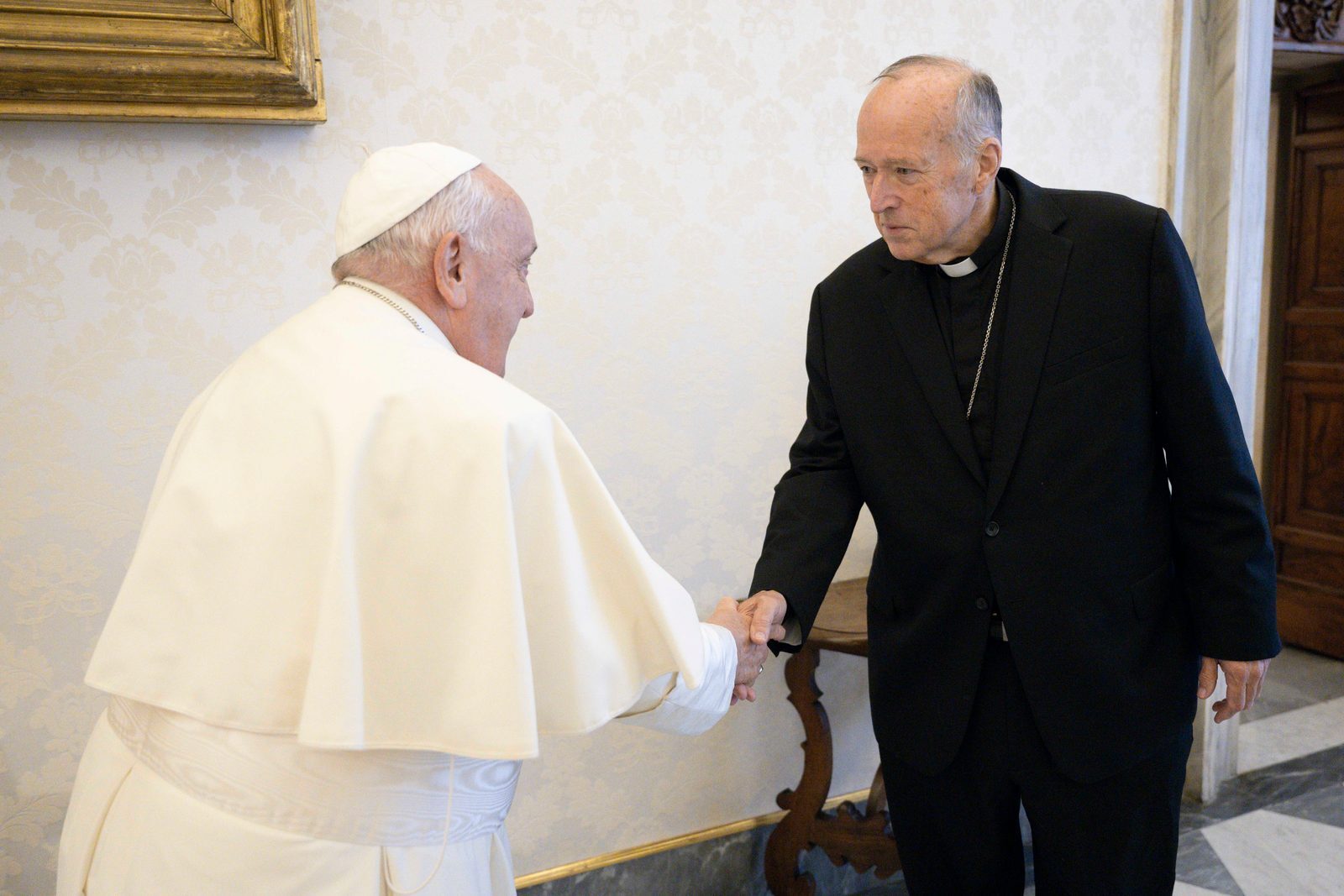Cardinal Robert W. McElroy will become the next archbishop of Washington, D.C., the Vatican announced Monday morning.
The cardinal is a passionate defender of migrants, speaks out often against polarization in the church and society and is a champion of Pope Francis’s vision for a synodal church. Pope Francis appointed Cardinal McElroy as the bishop of San Diego in 2015 and prior to that, he served as an auxiliary bishop in his native San Francisco.
A graduate of Harvard University with a doctorate in political science from Stanford University, Cardinal McElroy, 70, has also emerged as one of the most vocal proponents among the U.S. hierarchy of LGBTQ inclusion in the Catholic Church.
At a press conference in Washington on Monday, Cardinal McElroy said, “We are called to proclaim that everyone is welcomed on this journey, embraced in God’s love.”
Below is a round-up of Cardinal McElroy’s views on issues important to LGBTQ Catholics.
1. Cardinal McElroy has strongly condemned bigotry toward LGBTQ people
The cardinal called bigotry toward LGBTQ people “a demonic mystery of the human soul” and said the church’s “primary witness in the face of this bigotry must be one of embrace rather than distance or condemnation.”
In 2023, he wrote in America about conversations prompted by preparations for the Synod on Synodality, and suggested that the Synod might explore ways to admit LGBTQ people and divorced-and-remarried Catholics to communion, an act of “radical inclusion” in the life of the church.
Given the amount of attention the role of LGBTQ people in the church received at the time, he noted both the “widespread calls for greater inclusion of L.G.B.T. women and men in the life of the church, and shame and outrage that heinous acts of exclusion still exist.”
2. Pastoral care must be offered to all LGBTQ Catholics
In that same essay, Cardinal McElroy rejected the notion that the “distinction between orientation and activity” be the “principal focus” when it comes to pastoral care for LGBTQ Catholics, because “it inevitably suggests dividing the L.G.B.T. community into those who refrain from sexual activity and those who do not.”
That is, the church should not exclude LGBTQ people based on whether they are engaged in sexual activity. “Rather, the dignity of every person as a child of God struggling in this world, and the loving outreach of God, must be the heart, soul, face and substance of the church’s stance and pastoral action,” he wrote.
3. He has called the cathechism’s language about homosexuality “a disservice”
In an interview with the America Media podcast “Jesuitical” in 2023, Cardinal McElroy said that the way the catechism describes homosexual acts as “intrinsically disordered” a “problem,” because while the phrase is meant to serve as a philosophical term, most people read it as a psychological one.
“It’s a terrible word and it should be taken out of the catechism,” he said.
He said that in his role as bishop of San Diego, he wanted to make LGBTQ people feel as welcome in the church as anybody else.
“I really feel that Christ would totally agree with that,” he said. “That he would want every person, every L.G.B.T. person and their families, to feel equally welcomed in the church.”
4. Chastity is important—but Christianity encompasses much more
In an essay published in 2017 defending Building a Bridge, the book written by Outreach founder James Martin, S.J., Cardinal McElroy wrote that attacks against ministry to LGBTQ people is often animated by “a distortion of Catholic moral theology” that places chastity above all other Christian virtues, such as faith, love, hope, mercy and compassion.
LGBTQ Catholics, like all people, are called to lead lives of chastity, he wrote, and the “disciple is obligated to confine genital sexual activity to marriage.”
But, he continued, “Many times, our discussions in the life of the church suggest that chastity has a singularly powerful role in determining our moral character or our relationship with God. It does not.”
Rather, he suggested that Christians are called “to live out the virtues of Christ; we all succeed magnificently at some and fail at others.”
5. Meeting gay men with AIDS shaped his young priesthood
In a profile published last year in Harvard Magazine, Cardinal McElroy noted how meeting people dying from AIDS-related complications during his time as a young priest in San Francisco helped shape his views on issues of human sexuality.
One of Cardinal McElroy’s mentors at the time was the late Archbishop John Quinn of San Francisco, who supported ministry to people with HIV and AIDS. Archbishop Quinn introduced Cardinal McElroy to dying men who had been ostracized from their families and faith communities.
“I think it was then that I began to seek ways to show that LGBTQ+ persons are truly, equally members of the Catholic Church and that all dimensions and attitudes of exclusion should end,” he told the magazine.
6. The term “L.G.B.T.” was removed from synod documents in 2023 for political reasons
In 2023, as bishops and other church leaders wrapped up the first part of the Synod on Synodality, some LGBTQ Catholics were disappointed that synod leaders removed the phrase “L.G.B.T.” from a section about challenging pastoral situations in the church.
Speaking to America, Cardinal McElroy said that the reason the phrase was removed was because it had become a political lightning rod.
“One of the reasons for the difficulties with terminology now is that it has gotten tied up, particularly in Africa, with American foreign policy and conditioning foreign aid. And it’s widely interpreted as a colonialist [effort],” he said.
7. “Enduring animus” against gays and lesbians led to outcry against blessings
When the Vatican in 2023 released “Fiducia Supplicans,” a document giving priests permission to bless Catholics in irregular relationships, including same-sex couples, many LGBTQ Catholics rejoiced. But a backlash against the document, particularly from bishops in some African and Eastern European countries, ultimately led the Vatican to try to downplay the significance of the document.
In a speech last year, Cardinal McElroy blamed opposition to the document in the United States on an “enduring animus among far too many toward LGBT persons.”
Cardinal McElroy reminded priests in his diocese that they had no obligations to bless Catholics in same-sex relationships and interpreted the decision by some bishops conferences to abstain from implementing the document as a positive step toward ecclesiastical “decentralization.”
But he nonetheless maintained that “decentralization must not obscure in any manner the religious obligation of every local church in justice and solidarity to protect LGBT persons in their lives and equal dignity.”




